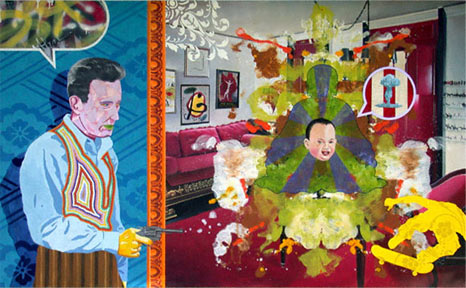Britt Ehringer
dal 6/5/2005 al 6/6/2005
Segnalato da
6/5/2005
Britt Ehringer
Bergamot Station Art Center SMMoA, Santa Monica
Baghdad Pizza Hut. We are bombarded with images from our TVs, the Internet, billboards on the roads, posters on the sidewalks. What the artist is interested in, what is signified by the multiplicity of narratives and symbols he draws from to build these paintings, is the nature of the patterns that take shape during these unruly interactions.

Baghdad Pizza Hut
In a world of images multiplying like germs, a painting can be a kind of
Petri dish. The paintings in Baghdad Pizza Hut investigate fluid moments in
the compound visual dynamic that defines our culture today. We are bombarded
with images from our TVs, the Internet, billboards on the roads, posters on
the sidewalks; the very air seems clogged with them; bacterial images
proliferating and intermingling every moment. What Ehringer is interested
in, what is signified by the multiplicity of techniques, styles, narratives
and symbols he draws from to build these paintings, is the nature of the
patterns that take shape during these unruly interactions.
The lexicon of objects in the work (roses, paint drips, nudes, landscapes,
costumes, foods, furnishings, butterflies, farm animals, weaponry, texts,
surfboards) are part of a primarily pattern-making process rather than a
specifically narrative one. However, due to the richness of the iconography,
they simultaneously support a fabulist function as well. In other words, the
objects¹ situations in a rigidly delineated system encourages them to
function like elements of abstract composition. Rather than follow a plot,
they create the illusion of narrative through juxtaposition. And, yes, women
are used as objects on this conceptual grid; but they are objects of beauty
and desire, much as works of art are themselves objects in a market economy.
Despite the sexually aggressive nature of several of the images, upon closer
inspection the surfaces reveal a fine craftsmanship that bespeaks more than
mere rebellion or iconoclasm. Ehringer demonstrates an obvious respect for
painterly technique and the conventions of art history; and his employment
of dozens of approaches within any given canvas emphasizes the hybrid
character of his vision. By making it impossible for figures to inhabit
anything like consistent space or a unified environment, the viewer is urged
to regard each painting as a compendium of choices. On the one hand, the
work¹s humor and clarity of meaning are rooted in faith in the ability of
strangers to communicate through images without language. At the same time,
forces are unleashed which deconstruct this channel and undermine the idea
that any image possesses an inviolable meaning. It¹s a high-wire act, hard
to achieve and nearly impossible to control. It is a slippery slope, but one
that inhabitants of the modern city navigate every time they open their
eyes.
On a more personal note, I was struck on the drive back from the studio by a
view I had from the 10 Freeway. To the north was grand vista of lush green
valleys that climbed up from the meadows that stretched away from the
roadside. Beyond them were snow-capped mountains reflecting the astonishing
gold-pink glow of the setting sun ahead of me. But intervening directly
between myself and the very edge of this vision were the billboards that sat
immediately off the road, forming a kind of bottom margin on the entire
paradisiacal scene. Horrid, crisp images of girls and beer and actors,
plenty of text, plenty of color. Jarring and annoying. But my irritation was
ameliorated almost immediately as the realization hit me: this is the
aesthetic paradox of the heart of Ehringer¹s work. We live in a world that
does not filter our images; we get it all from the hideous to the glorious;
we see it all and only then do we have the luxury of sorting it out for
ourselves. One has not got the option of closing one¹s eyes, for to do so
would be to miss every opportunity to receive beauty and grace and
life-giving stimulation, as well as every chance to figure out what it
means.
Opening Receptions: Saturday, May 7, 6-8pm
Bergamot Station Art Center
2525 Michigan Avenue - Santa Monica
Gallery hours, Tuesday through Saturday from 11am until 6pm



